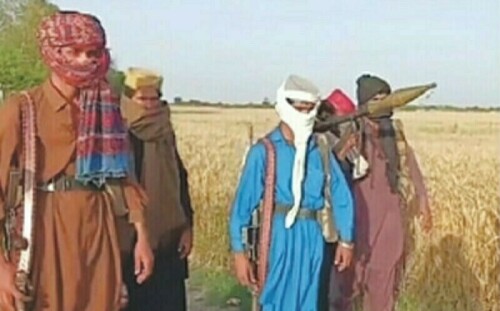THE riverine katcha region straddling Punjab and Sindh is back in the news after reports emerged of criminals attacking two police vehicles in the Machka area on Thursday.
At the time of writing, at least 12 policemen were confirmed to have been martyred. Whenever such disturbing incidents occur, the country’s attention is shifted to the katcha belt. Yet soon after, as other events start dominating the news cycle, these backwaters are forgotten until the next atrocity.
As per reports one of the police vehicles was ambushed near a field and the law enforcers were attacked by dacoits armed with rockets. Sources told this paper that criminal gangs had warned of revenge after the police killed one of their accomplices a few weeks ago.
On Friday, Punjab Police claimed the main culprit involved in the attack had been neutralised, while several suspects had been injured. The Punjab police chief had announced a ‘historic’ operation in the aftermath of the tragedy.
The dacoit problem in Sindh and Punjab’s riverine areas goes back decades, and several ‘grand’ operations have been launched, with some — in the early 1990s, as well as 2016 — involving the military. Yet the criminals seem to bounce back every time, indicating that the state’s approach is flawed.
Moreover, the katcha dacoits have made a business out of kidnapping-for-ransom, as well as ‘honeytraps’, luring victims from across the country. It must be questioned how criminal gangs are able to procure military-grade weapons. As per reports, the dacoits have been known to possess RPGs and even anti-aircraft guns. How is this heavy weaponry making its way to remote areas that lack even basic facilities? Besides, why does every anti-dacoit operation fail to bear results? Where the outlaws of the katcha belt go, we seem to be moving in circles.
Whether it is religiously inspired militants, separatist militias or the heavily armed bandits of the katcha region, the state must go after all violent elements instead of crushing ‘digital terrorists’ and other straw men. Interprovincial coordination between the Sindh and Punjab administrations is essential to end the bandit raj, with intelligence input from the security agencies.
Moreover, it needs to be ascertained whether the outlaws have sympathisers within the ranks of LEAs or powerful local patrons. If such links are established, these elements also need to face the law. The fact is that bandits living in 19th-century conditions are able to take on the state with 21st-century weapons, and the administration only fumbles for responses when there is a high-profile incident such as the Machka tragedy.
Also, the state should bring education, healthcare and jobs to the katcha belt, as poverty and lack of opportunities push locals to join the ranks of the dacoits.
Published in Dawn, August 24th, 2024













































Dear visitor, the comments section is undergoing an overhaul and will return soon.